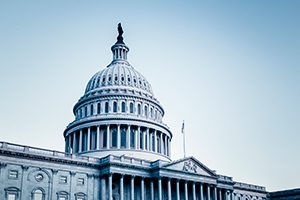COVID-19-Related Emergency Relief Provisions Set to Expire in 2020
 Two laws Congress passed in the spring of 2020 to provide temporary economic and regulatory relief to individuals and organizations impacted by the COVID-19 pandemic are due to expire by the end of this year. The Families First Coronavirus Response Act (FFCRA) and the Coronavirus Aid, Relief, and Economic Security Act (CARES Act) included significant provisions of relief related to leave and unemployment insurance (UI).
Two laws Congress passed in the spring of 2020 to provide temporary economic and regulatory relief to individuals and organizations impacted by the COVID-19 pandemic are due to expire by the end of this year. The Families First Coronavirus Response Act (FFCRA) and the Coronavirus Aid, Relief, and Economic Security Act (CARES Act) included significant provisions of relief related to leave and unemployment insurance (UI).
As congressional lawmakers furiously negotiate a proposal to fund the government beyond a December 18 deadline, there are hopes that additional COVID-19 relief could be attached to that legislation, including an extension of deadlines.
Below are the expiring provisions that are of significant importance to higher education.
Families First Coronavirus Response Act (FFCRA)
On March 18, President Trump signed into law H.R. 6201, the Families First Coronavirus Response Act (FFCRA), which created two forms of paid leave for workers impacted by the pandemic.
Division C – Emergency Family and Medical Leave Expansion Act (Expires December 31, 2020)
- Section 3102 (a) made amendments to the Family and Medical Leave Act of 1993 (FMLA) by requiring private-sector employers with fewer than 500 employees and all public-sector employers to provide employees who have been on the payroll for 30 calendar days up to 12 weeks of job-protected leave as established under the FMLA to care for the employee’s minor child whose school or place of care is closed, or whose care provider is unavailable due to the public health emergency. While the first 10 days of the leave are unpaid, the remainder of the leave is paid at two-thirds of an employee’s regular rate of pay for the hours they would be scheduled to work if the pandemic was not occurring. However, paid leave under this provision is capped at $200 per day or $10,000 total per employee.
Division E – Emergency Paid Sick Leave Act (Expires December 31, 2020)
- Section 5109 requires private employers with less than 500 employees and all public employers to provide up to 80 hours (prorated for part-time workers) of paid sick time for employees who are unable to work or telework due to COVID-19-related reasons. Under this provision, employers are required to pay each employee up to $511 per day or $5,110 total, or $200 per day or $2,000 total depending on the reason for the requested time off.
Division F – Tax Credits for Paid Sick and Paid Family and Medical Leave (Expires December 31, 2020)
- Sections 7001-7004 of the FFCRA provides private-sector employers with a payroll tax credit on qualified wages up to $511 per day for each employee who takes sick leave to self-quarantine or get a diagnosis, as well as a credit of up to $200 per day for workers caring for children or other family members who have been affected by the pandemic. Public-sector employers are not eligible for the tax credits.
Coronavirus Aid, Relief, and Economic Security Act (CARES Act)
On March 27, 2020, President Trump signed into law H.R. 748, the Coronavirus Aid, Relief, and Economic Security Act (CARES) Act. The CARES Act is a $2 trillion emergency relief bill designed to mitigate economic losses and support workers experiencing COVID-19-induced job disruption. Part of that relief includes temporary unemployment insurance benefits for workers unemployed because of the COVID-19 pandemic, as well as temporarily modified permanent UI programs.
Title II – Assistance for American Workers, Families, and Businesses
- Section 2102 – Pandemic Unemployment Assistance Program (PUA)
The CARES Act creates the Pandemic Unemployment Assistance (PUA), which provides support for individuals who are not otherwise eligible for benefits under the state UI system, including those who are self-employed, independent contractors or lack sufficient work history. The PUA system provides 39 weeks of unemployment benefits at normal state UI system rates for qualifying individuals. PUA is set to expire on December 26, 2020, for most states except New York, where it will expire on December 27. - Section 2107 – Pandemic Emergency Unemployment Compensation (PEUC)
The CARES Act provides for the enhancement of state UI offerings during the COVID-19 pandemic by allowing states to enter into agreements with the federal government. The enhanced UI system provides the normal 26 weeks of UI at regular state-set rates to individuals eligible for benefits under the state system. Upon exhaustion of those benefits, those individuals will be eligible for an additional 13 weeks at the normal state rate. PEUC is set to expire on December 26, 2020, for most states except New York, where it will expire on December 27. - Section 2104 – Federal Pandemic Unemployment Compensation (FPUC)
The CARES Act created a temporary, additional $600 benefit per week to individuals qualifying for UC, PUA and PEUC. For most states, FPUC expired on July 25, 2020.
CUPA-HR will inform members when more concrete information is available regarding these provisions and their statuses.


